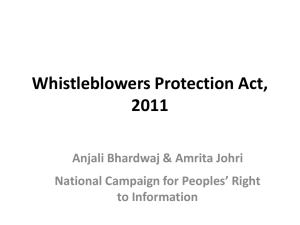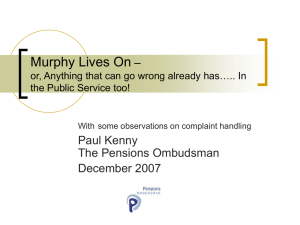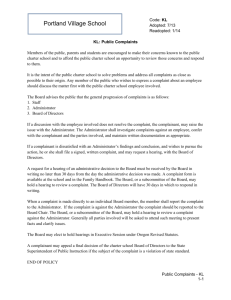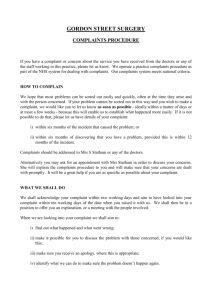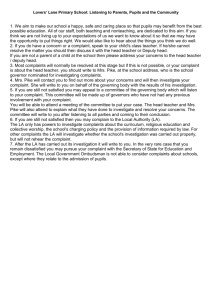Student Complaints and Appeals Procedure and Policy
advertisement
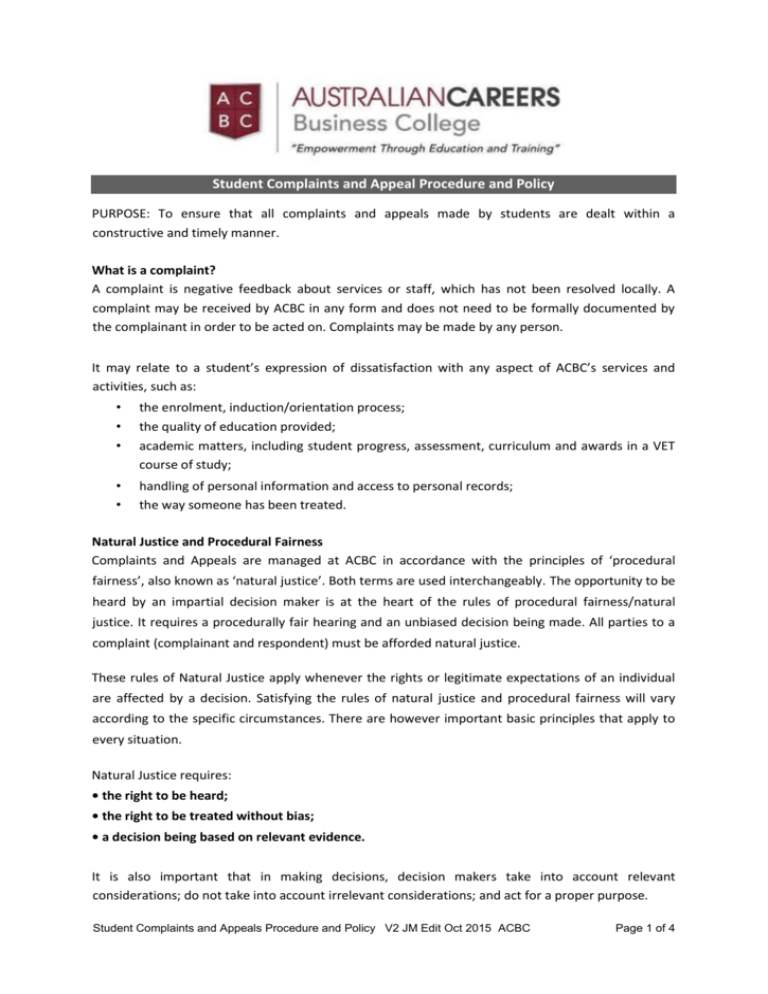
Student Complaints and Appeal Procedure and Policy PURPOSE: To ensure that all complaints and appeals made by students are dealt within a constructive and timely manner. What is a complaint? A complaint is negative feedback about services or staff, which has not been resolved locally. A complaint may be received by ACBC in any form and does not need to be formally documented by the complainant in order to be acted on. Complaints may be made by any person. It may relate to a student’s expression of dissatisfaction with any aspect of ACBC’s services and activities, such as: • • • the enrolment, induction/orientation process; the quality of education provided; academic matters, including student progress, assessment, curriculum and awards in a VET course of study; • • handling of personal information and access to personal records; the way someone has been treated. Natural Justice and Procedural Fairness Complaints and Appeals are managed at ACBC in accordance with the principles of ‘procedural fairness’, also known as ‘natural justice’. Both terms are used interchangeably. The opportunity to be heard by an impartial decision maker is at the heart of the rules of procedural fairness/natural justice. It requires a procedurally fair hearing and an unbiased decision being made. All parties to a complaint (complainant and respondent) must be afforded natural justice. These rules of Natural Justice apply whenever the rights or legitimate expectations of an individual are affected by a decision. Satisfying the rules of natural justice and procedural fairness will vary according to the specific circumstances. There are however important basic principles that apply to every situation. Natural Justice requires: • the right to be heard; • the right to be treated without bias; • a decision being based on relevant evidence. It is also important that in making decisions, decision makers take into account relevant considerations; do not take into account irrelevant considerations; and act for a proper purpose. Student Complaints and Appeals Procedure and Policy V2 JM Edit Oct 2015 ACBC Page 1 of 4 When you register a complaint or appeal at ACBC, you can be assured that you matter will be heard in accordance with the guidelines set out in this document. Early resolution of complaints and appeals In all cases, issues that arise during training and assessment that are the source of frustration or are in dispute should be resolved at the time they occur between the persons involved, where possible. Sometimes, it will not be possible and in these cases, you are encouraged to come forward and inform us of your concerns with the confidence that you will be treated fairly. Procedure This procedure can be utilised by students, including potential students, enrolled, or seeking to enrol, in a qualification with ACBC to submit a complaint of an academic or non-academic nature. Complaints of an academic nature include matters related to student progress, assessment, curriculum and awards in a VET course of study. Complaints of a non-academic nature cover all other matters including complaints in relation to personal information that ACBC holds in relation to the student. During all stages of this procedure, ACBC will take all steps to ensure that: • • the complainant and the respondent will not be victimised or discriminated against; the complainant has an opportunity to formally present their case and each party to the complaint may be accompanied and assisted by a support person at any relevant meetings; • a full explanation in writing for decisions and actions taken as part of the process will be provided if so requested by the complainant or the respondent; • where the internal or external complaint handling or appeal process results in a decision that supports the complainant, ACBC will immediately implement any decision and/or corrective and preventative action required and advises the complainant of the outcome. There is no cost to the complainant for utilising this complaint and appeals process. Before an issue becomes a formal complaint Students are encouraged, wherever possible, to resolve concerns or difficulties directly with the person(s) concerned. The administration support staff are available to assist students to resolve their issues at this level. STAGE ONE–Formal Complaint Formal complaints must be submitted in writing to the Campus Manager using a Student Complaint/Appeal Form available from Administration. Receipt of the complaint will be acknowledged within 5 working days and the complaints process will commence within ten days of the receipt of the written complaint and all reasonable measures will be taken to finalise the process as soon as practicable. Student Complaints and Appeals Procedure and Policy V2 JM Edit Oct 2015 ACBC Page 2 of 4 The Campus Manager, or their nominee, will then, if necessary, seek to clarify the outcome that the complainant hopes to achieve. Such clarification may be sought by written or verbal request or by a face-to-face interview with the complainant. When such clarification occurs in a face-to-face interview the complainant or respondent may ask another person to accompany them. The Campus Manager, or their nominee, will then endeavour to resolve the complaint and provide a written report to the complainant on the steps taken to address the complaint, including the reasons for the decision, within 10 working days. The report will further advise the complainant of their right to access the internal appeals process if they are not satisfied with the outcome of their formal complaint. STAGE TWO – Internal Appeal If a complainant is dissatisfied with the outcome of their complaint they may lodge an appeal by writing to the CEO (who is senior to the original decision maker). An appropriate person or committee will be appointed to consult with the complainant and other relevant parties within ten working days. Where possible such consultations should take the form of face-to-face interviews. The complainant or the respondent may ask another person to accompany them to these interviews. Following the consultation, the CEO, or their nominee, will provide a written report to the complainant advising the further steps taken to address the complaint, including the reasons for the decision, within 10 working days. The report will further advise the complainant of their right to access the external appeals process if they are not satisfied with the outcome of their internal appeal. STAGE THREE – External Appeal If the complainant is dissatisfied with the outcome of their appeal, they may make a written request to ACBC that they wish the matter be dealt with through an external dispute resolution process facilitated by an independent third party mediator acceptable to both parties. An independent mediator will be accessed within 14 working days. It is then up to the mediator, the complainant and ACBC to resolve the complaint. ACBC will bear any costs related to mediation. The complainant or the respondent may ask another person to accompany them to meetings with the mediator. The mediator will report to the CEO, or their nominee, the outcome of the mediation, including any recommendations arising, within 14 days of the completion of the review. Once the CEO or their nominee receives the report of the outcomes from the discussion or mediation, they will provide a written report to the complainant within 10 working days on the recommended actions to resolve the complaint. ACBC agrees to be bound by the independent mediator’s recommendations and the Student Complaints and Appeals Procedure and Policy V2 JM Edit Oct 2015 ACBC Page 3 of 4 CEO, or their nominee, will ensure that any recommendations made are implemented within 30 days of receipt of the mediator’s report. Further action This agreement, and the availability of complaints and appeals processes does not remove your right to take action under Australia’s Consumer Law (effective 1 Jan, 2011). Students seeking to make an external complaint about any administrative decision should do so after following the Colleges appeals processes by contacting: NSW Department of Fair Trading Telephone 13 32 20 www.fairtrading.nsw.gov.au For complaints relating to an alleged breach of the colleges’ APP Privacy Policy, students should use the college’s prescribed internal processes for managing complaints as described in this student handbook. If unsatisfied with the handling of a complaint related to privacy, the individual should contact the Office of the Australian Information Commissioner to commence external complaint proceedings. Details of how to make a complain externally can be found on the website of the Office of the Australian Information Commissioner http://www.oaic.gov.au/privacy/making-aprivacycomplaint. If a complaint still remains unresolved after the external appeal through fair trading, the complainant may decide to refer the matter to the Australian Skills Quality Authority (ASQA) on 1300 701 801. The procedures set out in this document do not replace or modify procedures or any other responsibilities, which may arise under other policies or under statute of any other law. Nothing in this policy and procedure limits the rights of individuals to take action under Australia’s Consumer Protection laws. Also, these procedures do not circumscribe an individual’s rights to pursue other legal remedies. Enrolment status Where a student chooses to access this policy and procedure, ACBC will maintain the student’s enrolment while the complaint handling process is ongoing. Record keeping & confidentiality A written record of all complaints handled under this procedure and their outcomes shall be maintained for a period of at least 2 years to allow all parties to the complaint appropriate access to these records, upon written request to the Director of Studies. These records will be maintained at 149-151 George Street, Liverpool, NSW 2170. All records relating to complaints will be treated as confidential and will be covered by ACBC’s APP Privacy Policy. Student Complaints and Appeals Procedure and Policy V2 JM Edit Oct 2015 ACBC Page 4 of 4
